In 2017, journalist Helen Barry was shocked by what she saw in a television documentary about plastic waste. But rather than giving in to despair, she decided to fight. In addition to her successful War on Waste Weekly blog, she now creates beautiful, eco-friendly soap that she’s proud to ship with Sendle.
People tend to scrutinize their beauty and bathroom purchases less than others, because cleanliness and grooming are of the utmost importance. We give ourselves a pass for all that packaging, and often don’t even recycle it because the bathroom is small and we’re trying to keep it tidy. If you’re ready to reinvent your restroom routine, why not keep the plastic out of it as much as possible, and look for products that are environmentally friendly in other important ways?
Enter War on Waste Weekly, created by Sendler Helen Barry. She fights plastic waste in all aspects of her life, and loves sharing her all-natural message via beautiful and eco-friendly soaps she makes herself.
Sendle’s small biz quiz

Founder (Helen Barry)
photo by Matt Coyte
What’s your name, your title within your business, and your location?
Helen Barry | Founder and soap maker | Sydney, Australia
How would you describe your business in a nutshell?
WOWW is a small handmade soap business in Sydney with a zero waste ethos. WOWW seeks to banish plastic bottles from your skincare routine by making plastic-free bar soap and skincare products from all-natural, plant-based ingredients.
And in three words?
Zero waste soap!
Tell us more about your soap.
I use Australian clays, local unrefined beeswax, and essential oils. I like to incorporate upcycled materials in my soap as well. My soap is free from synthetics, artificial fragrances, and palm oil. That’s one of the main differences between the soap I make and the soap you buy in the supermarket.
Palm oil was all over the news a few years back, long enough that people may not remember why. Can you share why you don’t use it?
I don’t use palm oil because it’s caused massive deforestation in Asia. It’s a very ubiquitous ingredient, in just about everything. If you go to the supermarket, you’ll see “vegetable oil” on the packets of biscuits and all sorts of things. The labeling laws are such that they don’t have to declare that it’s palm oil in Australia. They can be very sneaky about including palm oil in things. There is sustainable palm oil, but with supply chains the way they are, it’s very hard to trace things back to know, are they actually doing the right thing? Is it sustainable? Or is that just a bit of greenwashing?
What did you do before launching your business?
I was a freelance journalist working in magazines and I’ve got two young boys, so I’ve been quite busy juggling those things. I was doing public relations for a reusable coffee cup company called Claycups. I was working with the owner Steve on their ceramic, plastic-free cups and that’s when I became interested in the war on waste. At the same time, there was a big TV show in Australia called War on Waste and it got me fired up. I’m a copywriter as well, I wear many hats.
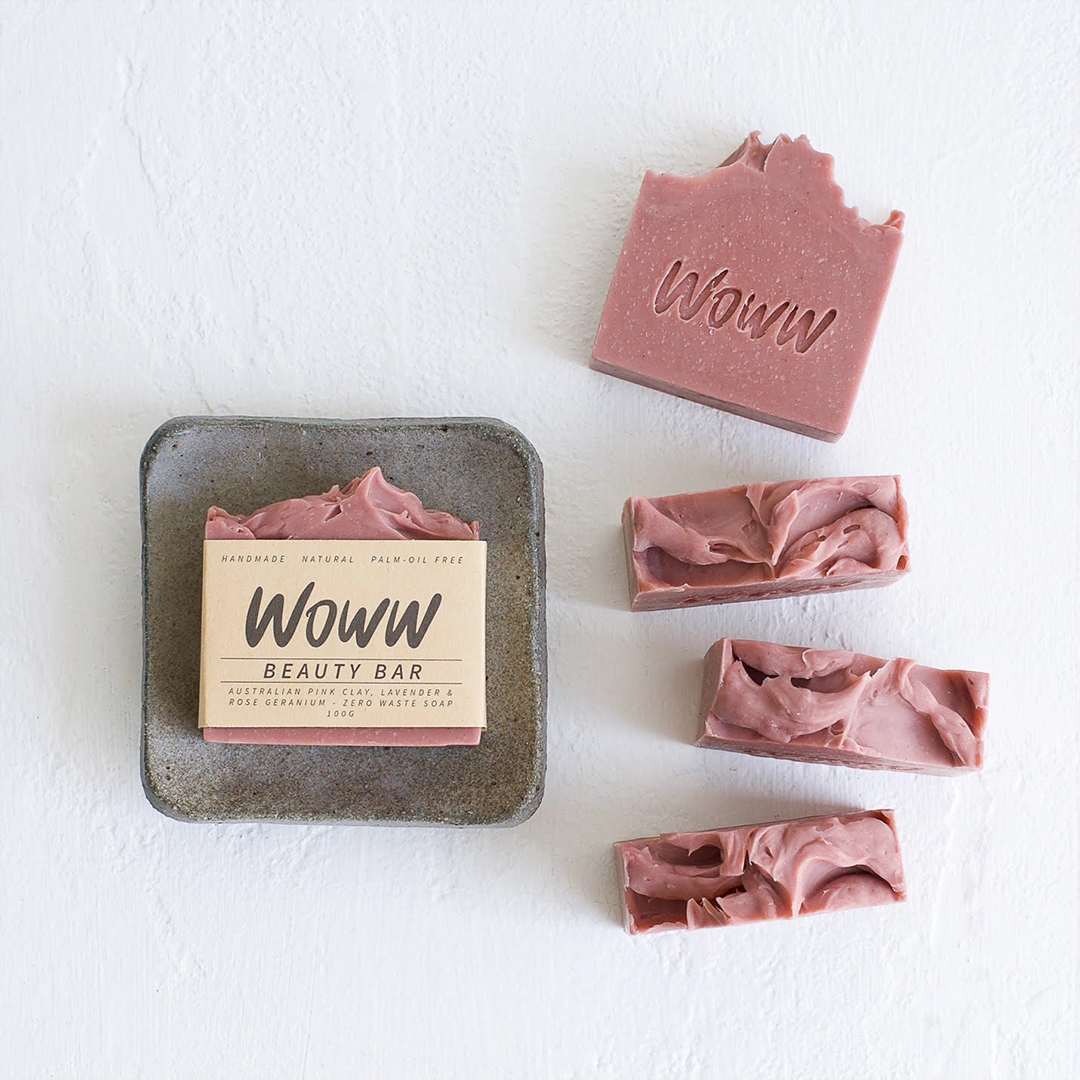
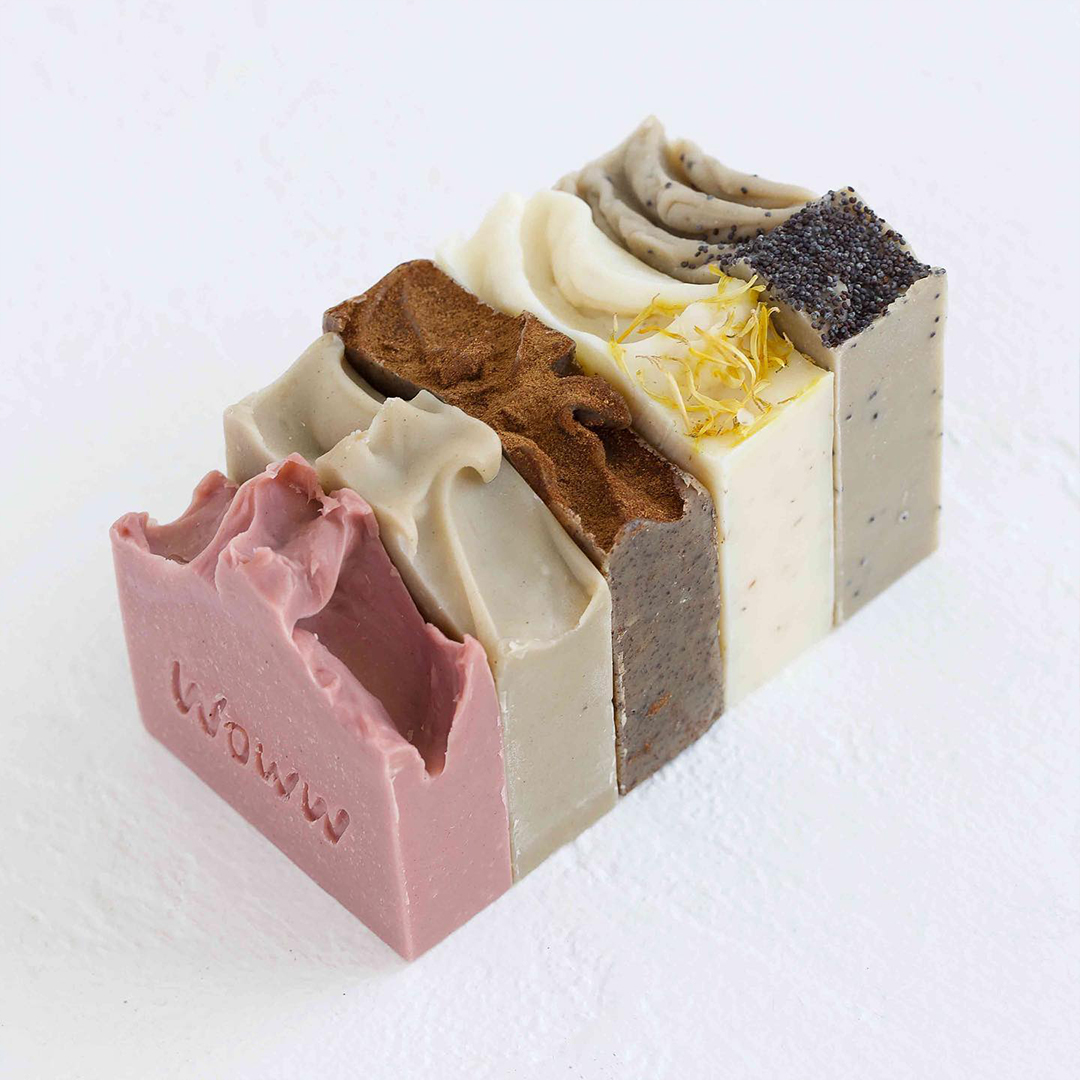
Soap product shots by @lynmccreanor
How did you find Sendle?
Through Claycups, Steve had boxes and boxes of these cups and I was thinking, how on earth do you get them out of this basement? When do you have time to do that? He said, “Well, I use Sendle! They’re great, they come to your house. They’ll pick up your product and take it everywhere, around Australia and even overseas. That really appealed to me at the time because, honestly, as a mother with two children running two businesses, I don’t have time to go to the post office. Sendle really made my business possible. If Sendle didn’t exist, I don’t think WOWW would exist.
Then COVID happened and it gave me more time to put more footwork into my business.
What do you love about shipping with Sendle?
I love the fact that it’s carbon neutral because my business is all about reducing waste and I have a really ethical ethos in general. Sustainability, reducing carbon, all that stuff’s really important to me. I wouldn’t want to ship with a carrier that didn’t care about those things because they’re important to me and to my clients. That’s probably the number one reason I use Sendle. But the convenience, the efficiency, and the fact that I can count on them. Sendle never disappoints me.
You spoke extensively on The Grown-Up Girls Report about Bea Johnson’s zero waste philosophy that focuses on 5 Rs. I think most people are very familiar with three of them, Reduce, Reuse, Recycle. Let’s chat about the first and last Rs: Refuse and Rot.
Refusing is an act of speaking up. It’s a way of showing companies that you’re not going to take wasteful packaging and that they need to do something to change. I don’t think it’s hard when you walk into a cafe for instance and they serve your order in a plastic container. It happened to me yesterday with a milkshake and I immediately said something. I don’t like to be a difficult person but I think it’s important to say, “Look, this isn’t how I want things.” Especially after the last time I’d been in there, they didn’t serve it to me that way. I didn’t know I needed to speak up about it. But I think speaking up and saying, “I don’t take single-use plastics, I take reusables.”
People are starting to understand the issue with waste. Especially with coffee cups, there are billions that are going into waste each year. But to go somewhere and sit down, and be served in a disposable container makes my blood boil. I can’t take it, I have to say something. But I say it with a smile! I think it’s ok to refuse things and let them have a chance to do it better next time.
The other thing I refuse to do is when I go into the supermarket, if I see things that are in plastic–particularly in the fruit and veggie aisle–I won’t take them. I contacted a lot of the supermarkets here in Australia because they used to wrap all their bananas in plastic. Why? It comes in its own wrapping!
I think if enough people refuse, things change. Social media is amazing, the way you can contact companies directly now and protest what they’re doing with their packaging.
On the subject of “Rot”, food waste is actually a huge problem in landfills because it creates methane. You can’t throw away food and pretend that it composts in a landfill.
That’s right, especially when you dispose of it in plastic bags. Traditionally you line your garbage bin with plastic and put all your vegetable scraps and stuff in it, tie it up, and it goes off to landfill. It sits there and turns into this putrid pile of fermenting methane gas that goes straight up into the atmosphere. I really think “Rot” is one of the most essential things people have got to come to grips with. We’re very lucky where I live to have what’s called a FOGO system, it’s a food and organics program that’s run by the council. They supply little bags made of cornstarch and I put all my bits of eggshells, vegetables, and scraps I can’t reuse. Instead of putting it in the garbage, it goes in the FOGO, and once a week they take that waste away and turn it into gas they can reuse, and fertilizer.
If your local council doesn’t offer that, you can definitely have a compost or a worm farm in your back garden. Separate out all your scraps, turn it into something beautiful that you can put back into the soil and grow some veggies with it. Make use of that resource.
Back to your business, how did you get into soap making?
I’d started War on Waste Weekly as an Instagram, and had decided with my boys as a family that we would reduce our waste by one thing each week, for a year. A zero waste challenge. I got rid of my disposable coffee cup habit with a beautiful reusable cup that wasn’t made of plastic. Then we moved from plastic to bamboo toothbrushes. Then we started shopping in bulk; instead of going to the supermarket for everything, I’d take containers to our local bulk store. Slowly, we turned from an average family into an eco family.
There were pain points along the way, especially with the children and plastic toys. There’s a lot of plastic that comes with children! But they’re starting to understand that all that plastic is made from petroleum that we take out of the ground, to make stuff out of it that we don’t even need.
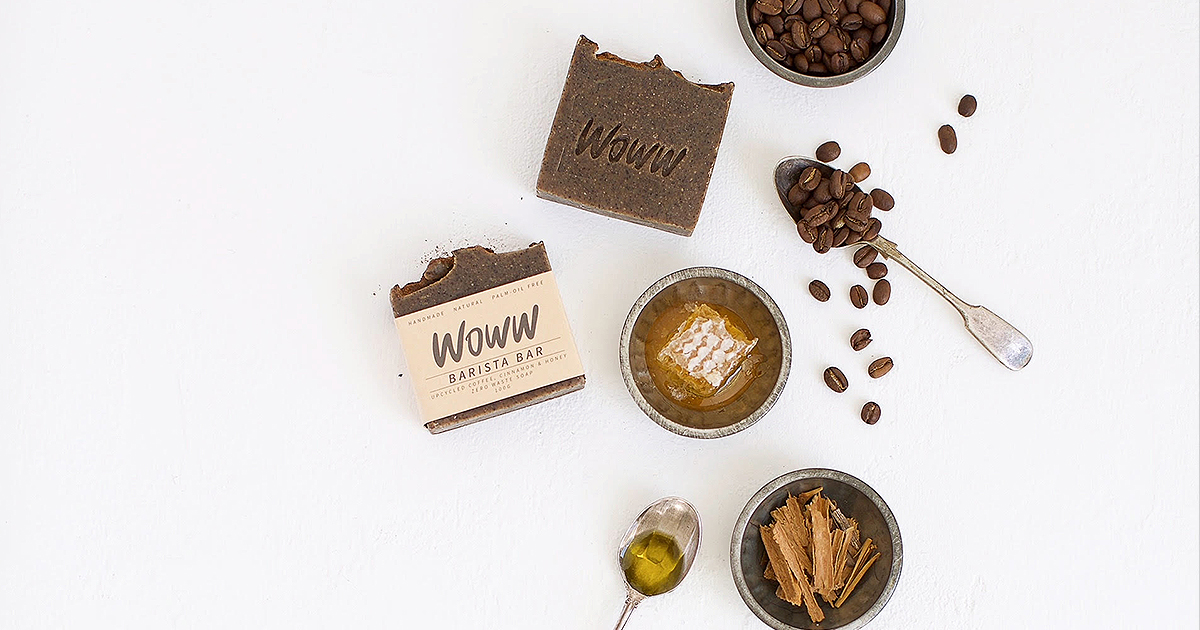
Soap product shots by @lynmccreanor
My project on Instagram got quite popular. Then I realized I wanted to talk more in depth about it, so I started the blog. I started interviewing other people about what they were doing, and offering tips to people who wanted to reduce their waste. But in a realistic way! Not in an overwhelming way, because I think if you’re overwhelmed, you do nothing.
One of the things I was frustrated by was plastic in the bathroom. I started thinking, I don’t want these plastic liquid soap containers, I don’t want body wash. Why can’t I just have a bar of soap? But of course when I went to the supermarket, all the soaps had palm oil. So switching to bar soap was just going to cause another problem I wouldn’t be happy with. I did a bit of research and looked into traditional cold process soap making. That’s when you put lye and oils together and a chemical reaction happens, saponification. The result is glycerin and soap.
I went off and took a soap making course, and I loved it. It’s totally addictive, this amazing alchemy. You watch the lye and the oils come together and it magically transforms in front of your eyes, it’s just a beautiful thing. I started making it for family and friends, and they loved it because soap made this way comes with glycerin. The soap you buy in supermarkets has the glycerin stripped out and they put it into other products like moisturizer.
So you use one product that removes the moisture from your skin, and another to put it back.
Exactly. I started making my soap even more moisturizing with beautiful, unrefined organic shea and cocoa butter. I found I could make this really beautiful product that you could use on your body and your face, and it took plastic out of the equation for people. I like creating something that’s beautiful, but eco. So you’re not suffering to be eco, I’m a bit over this idea that it has to be a trial, giving up, sacrificing, Why can’t it be beautiful? Nature is beautiful, why can’t giving up plastic be a beautiful thing?
Can your soap be used for hair, or do you have to use something else?
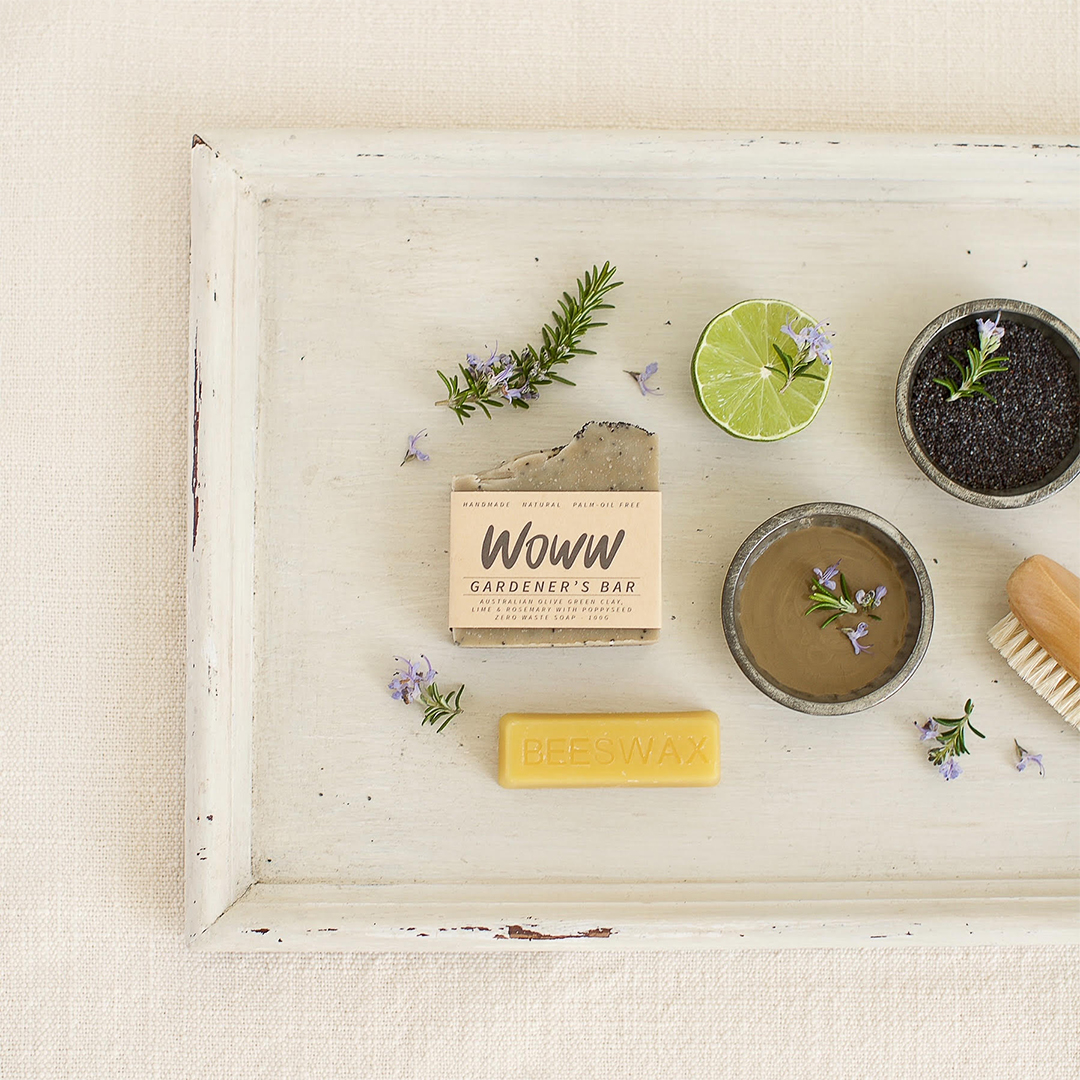
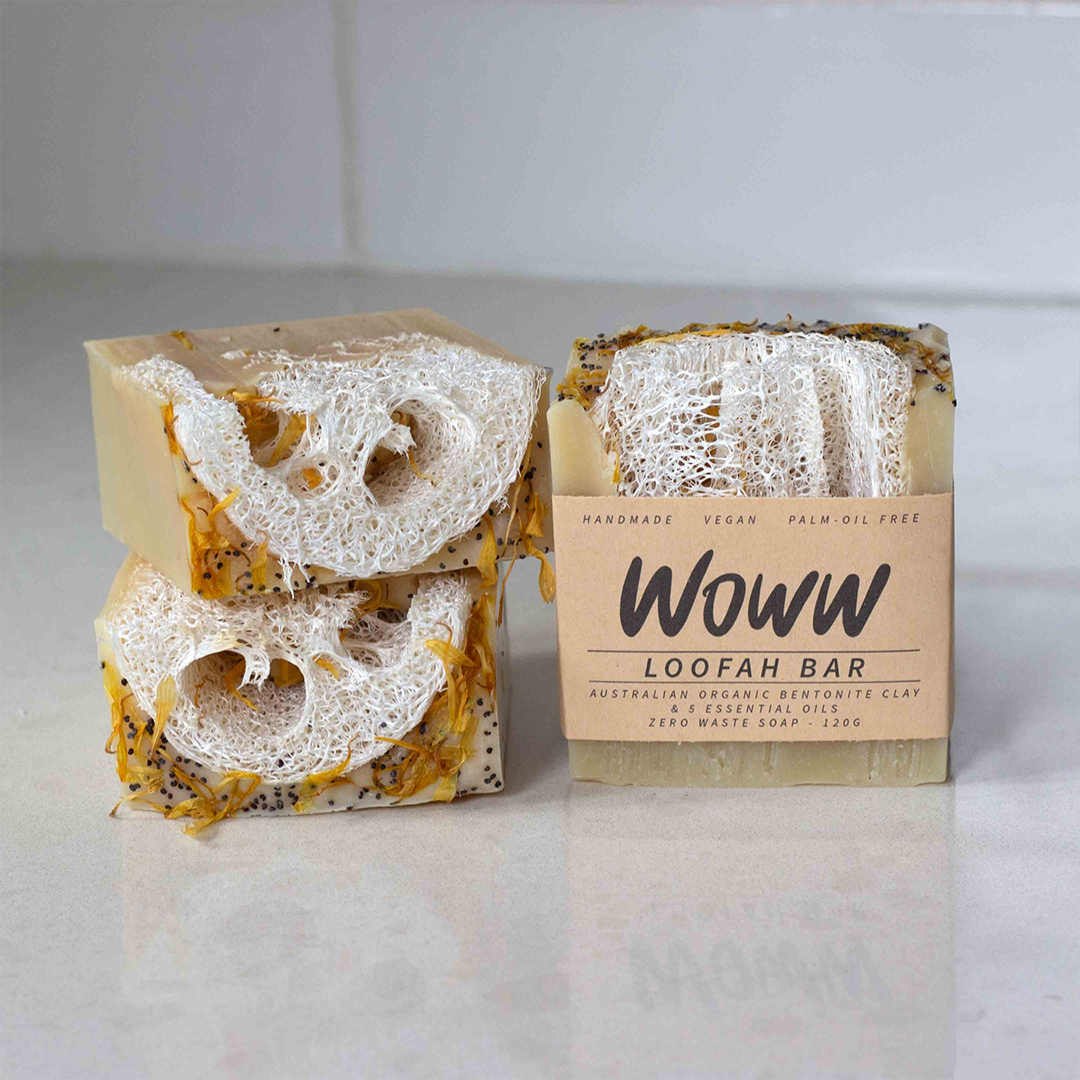
Soap product shots by @lynmccreanor
No, some people can use soap in their hair, but the pH your scalp needs is different from your skin. I’m looking into working with plant-based surfactants like those you find in shampoo bars. I hope to bring them into the WOWW product line soon. I’d really like to have a totally plastic-free bathroom for everyone.
If you think about body wash, that came about in the ‘80s and before that we just had bar soap. Originally it was something you maybe saw only in hotels but then suddenly you could get it anywhere, in a plastic bottle. Assuming the body wash users in the United States go through a bottle a month, that’s 2.7 billion bottles each year from America alone.
Tell us about your packaging. A lot of people probably get overwhelmed when trying to break the soft plastic habit. How did you do it?
I try to keep things as natural as possible. I use brown, unbleached cardboard boxes made from recycled cardboard. I think it’s worth sourcing those kinds of things to lessen your impact. It sounds simple, but using a brown cardboard box instead of a plastic mailer, it can be composted, reused, or recycled. There’s a great Australian company called Hero Packaging that makes home compostable mailers, and they break down without harming the soil.
There are so many great options now, you don’t have to use plastic to ship. Customers notice. It makes a difference when you do that. My approach is minimal, the idea is “less is more” in terms of saving the environment and the planet.
Do you have any tips for people switching over to bar soap? Is there a wrong way to do it or something people overlook?
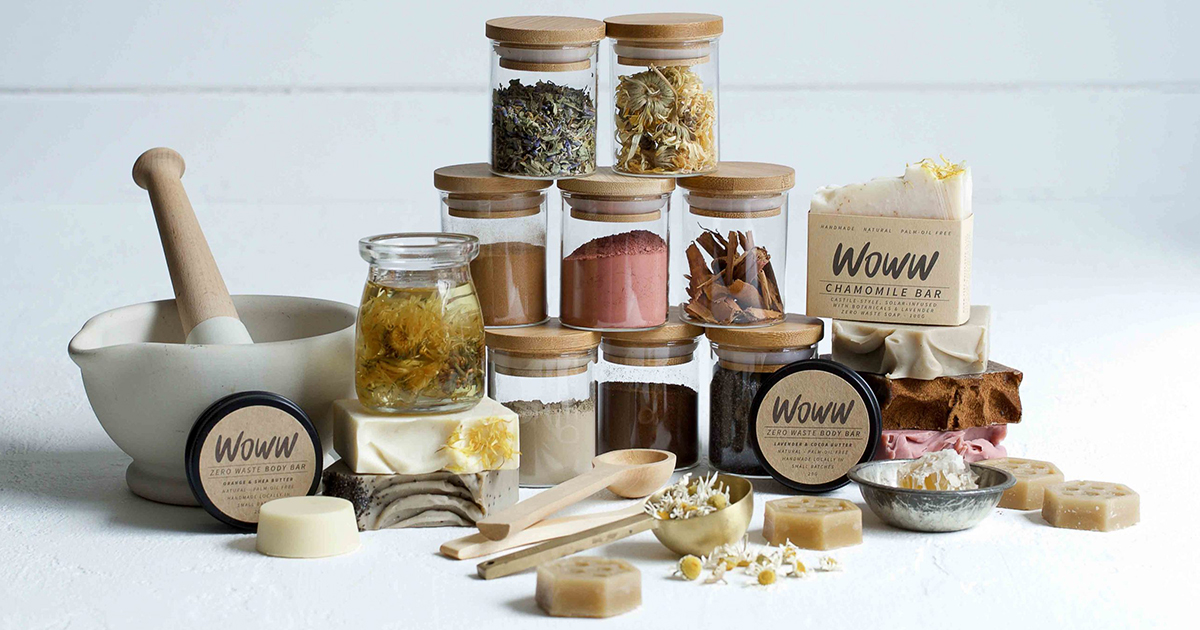
Soap product shots by @lynmccreanor
You really need a good soap dish if you’re switching to handmade soap, especially if it’s not made with palm oil, it’s not as hard. It’ll stay hard if you let it dry out between uses. If you’re going to use it as hand soap, cut the bar up into four pieces, put three away, and just have a small cube of soap. It’ll stay fresher, longer that way; you get a nice new bar of soap once a week instead of this massive bar that's harder to dry out.
You really need to let your handmade soap dry between uses, don’t keep it in shower because it’ll turn into a soft, messy blob. Keep your soap dish somewhere like the window sill where it can dry out.
I’ve got some beautiful soap dishes on my website made by local artist Katherine Mahoney. I love everything being handmade, we live in a world where so many things are made by machines, we’re missing that contact with something that’s made by a human. I think that’s one of the most beautiful things about a handmade soap. Another human made it! Put it on a beautiful soap dish that’s also made by a human.


